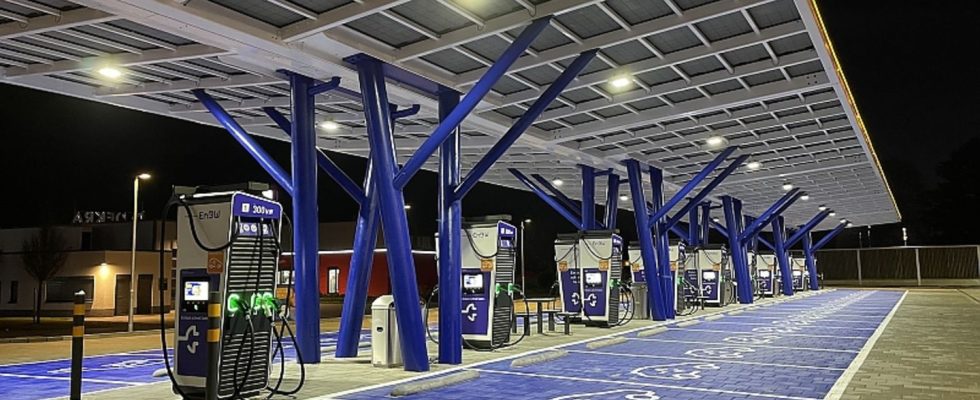Guide: Electricity price and charging speeds in Europe
Before the big tour
EnbW Kamen Cross
© press-inform – the press office
For many drivers, this summer is the first time they will be going on vacation in their own electric vehicle. There are a few things to consider.
In most European countries, the charging situation, especially on the major connecting roads, is now so good that you don’t have to worry about getting to your destination safely. In Northern and Central Europe in particular, there is a wide network of charging stations at service areas, truck stops, shopping centers and fast-food restaurants on the motorways. In southern Europe things sometimes look a little different. Especially those who are traveling in the south of Italy, in Croatia, Spain or Portugal should take a closer look beforehand where the charging stations are located and what charging speeds can be expected. Because charging parks are one thing, but if the fast chargers only charge with 50 kilowatts, the journey from Frankfurt to Naples or from Munich to Barcelona can take significantly longer than you are used to from driving with a combustion engine.
The expansion of the charging network along the major connecting roads across Europe is in full swing, albeit at different speeds. Therefore, you should not only look at the charging stations themselves, but also take into account that some stations may be defective or that the promised charging speed can be halved if each of the charging stations is occupied. The promised 300 kilowatts quickly become 150 kilowatts and the unimpressive 100 kilowatts can be halved to just 50 kW. Especially at peak traffic times, the large transit routes and the charging plugs there can get crowded, as the family would like. A short charging stop is sometimes not enough because several vehicles are coming across a few charging stations. It can therefore get tight on a weekend and you should, especially if you are traveling with children or pets car is on the way, factor this into the travel time. The same applies here as to avoiding traffic jams: at night, in the early morning or late evening hours, it is emptier than usual. This not only ensures a more relaxed journey, but also lower temperatures and less stress – even when refueling.
Before you go on summer vacation with an electric car, it is also advisable to take a look at the prices at the European charging stations, as these can sometimes vary considerably. One of the widest charging networks in Europe comes from Ionity. There are currently over 2,500 Hyperchargers in 512 charging parks in 24 European countries. Italy, Germany and France in particular are all supplied with fast chargers. With a total of currently 128 Ionity charging parks and 672 charging points, France is at the forefront in terms of fast charging infrastructure. Ionity already operates numerous charging parks with up to 18 charging points, many of them with solar roofs, along the sun highway from north to south or the popular Mediterranean coast from Nice to Marseille. The new Ionity stations such as Affi on Lake Garda, near Rome or further in the direction of Naples and on to Sicily are new and particularly well located on holiday routes. But those who recharge their own electric car without a volume contract sometimes have to dig deep into their pockets.
In France, a kilowatt hour without monthly fees costs 0.69 euros; in Belgium it is even 0.79 euros or in Switzerland 0.79 francs. With the Passport tariff, the kilowatt hour is usually reduced by 0.20 euros / kWh – but only for a monthly minimum fee of 11.99 euros. This is cheaper after the recent price reductions on the Tesla Superchargers. More and more of them are also open to third-party electric cars. Unlike most other providers, the prices vary depending on the time of day and it is only particularly cheap here with the Supercharger tariff, which costs 12.99 euros per month. But then you can sometimes refuel for as little as 0.37 euros per kWh. Without the volume contract, it is 0.50 or 0.57 euros per unit. Advantage: the Tesla Superchargers are mostly in larger charging parks and it can therefore be worth downloading the Tesla app as a third-party brand. This saves waiting times and is often cheaper than with Ionity or a provider like EnbW.
The Swabians from EnBW want between 0.45 and 0.79 euros for a kilowatt hour at the standard rate, depending on the charging speed. If you use the widespread ADAC e-charge card, you pay between 0.51 and 0.79 euros per kilowatt hour, depending on the charging provider. With the Dutch charging network operator Fastned, a kilowatt hour on a Hypercharger costs between 0.59 and 0.69 euros throughout Europe. There is a 30 percent discount on the charging price at the charging stations in the so-called Gold Member tariff, which costs 11.99 euros per month. You are one of the few providers who can simply pay for Aral Pulse charging stations by credit card. However, this is not cheap at EUR 0.79 per kilowatt hour.

